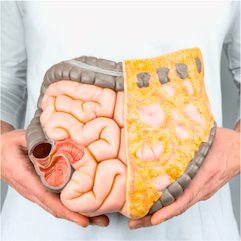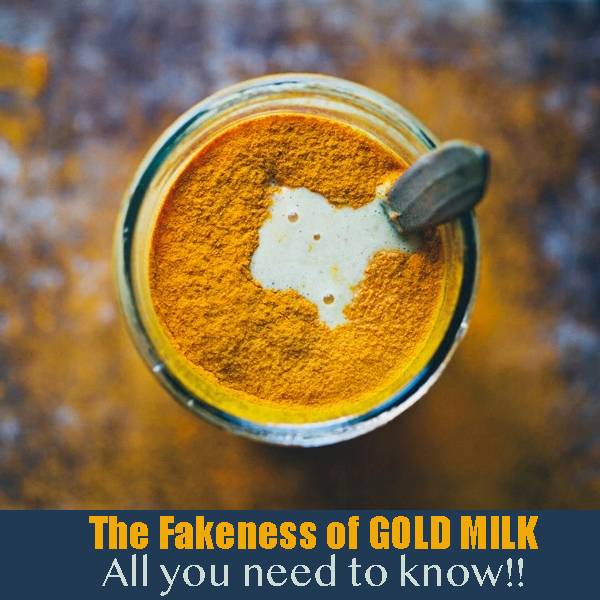What does Make Ulcerative Colitis Curable with Ayurveda?

Ulcerative colitis is a disease of unknown cause that causes inflammation and ulceration in the colon (large intestine). The “incurable” part means that despite our technological advances we are still unable to cure UC. Why? Because it has been so difficult to establish exactly what actually causes UC; until now. We will look at the incurability and curability of ulcerative colitis at the same time. And will answer what does make ulcerative colitis curable with Ayurveda?
TNFalpha—the incurable factor in ulcerative colitis!
UC is an autoimmune disease. This means that your body attacks itself. In UC there is a chain reaction where your body comes under attack by toxins linked up with proteins which make genes produce molecules called cytokines which play a vital role in signaling between cells. One of these cytokines is TNFalpha, for tumor necrosis factor-alpha.
Overproduction of TNFalpha causes direct inflammation, ulceration, and increased permeability of the wall of the colon to toxic waste products. These toxins irritate the defenseless mucosal cells which respond by secreting enzymes that cause massive tissue damage in turn causing more cytokines and producing a vicious downward spiral which can eventually lead to sepsis (potentially fatal blood infection) or colorectal cancer.
Incurable ulcerative colitis—i.e., impossible to stop once started because your body has gone rogue attacking itself so no medicine will block it! Simply put, UC is curable. Only if you stop making too much TNFalpha. Or reducing its effect already produced –not entirely stoppable though.
Why UC is still incurable with medicines?
The reason why UC remains “incurable” with conventional drugs lies in the fact that these drugs are designed to work on symptoms, not causes.
They will help relieve the spasm of the colon. But they cannot remove TNFalpha already there or stop it from being produced. So you need to deal with this factor at source and hence our new discovery!
- What does it mean then if we can now cure ulcerative colitis?
- Why should UC be curable whilst other autoimmune diseases like multiple sclerosis are not?
And how could we get a handle on destroying TNFalpha once it has been exacerbated by your genes? What gene mutations could cause too much TNFalpha to be produced?
Why not stop it at source?—i.e., the gene!
In diseases like MS we have found environmental risks factors–so can we do the same with TNFalpha and UC?
Viruses like Epstein-Barr and intestinal bacteria can be triggers for inflammatory bowel disease (IBD)/ulcerative colitis in genetically susceptible people. But these external causes cannot cause acute UC.
So why are some people more susceptible than others?
What was missing from all these theories that explained the actual causes of IBD? In fact, what has been missing is precise knowledge of how genes themselves trigger. And leat to extra productions of TNFalpha resulting in chronic disease.
The answer lay within us. All our lives waiting to be discovered if only we look for it!
What triggers too much TNFalpha production in the first place?—it’s all down to our genes!
The HLA gene and its complexity for UC
The answer is that there are genetic high-risk factors for developing UC. One gene involved in this is HLA typing. Dr. Daniel Rotter of the State University of New York at Stony Brook, NY, in 1987 discovered this gene.
But what does this have to do with ulcerative colitis being curable or not? The human genome project which discovered 30,000 genes also finally answered this question: certain gene variants associated with chronic inflammation of the colon (i.e., ulcerative colitis) are indeed “incurable” because they make it inevitable that there will be a higher risk of developing the disease in the first place!
It is not enough to eliminate the trigger–the TNFalpha already produced must also be destroyed!—only then can your body heal.
The good news for you is that you can potentially avoid ever experiencing ulcerative colitis symptoms in the first place. But how? If genes predispose to UC. Then certainly other genes must protect against the disease if any chance of cure exists at all. While HLA typing studies have been carried out on thousands of people, one research team has just discovered certain genetic polymorphisms which appeared to significantly reduce a person’s risk of getting IBD.
How does Ayurveda cure ulcerative colitis?
What is intriguing for us to note in our new discoveries is that this protection against UC lies within your own body! Vaidya Pardeep and his team have already revealed a new gene-based anti-TNFalpha treatment that can stop the disease from becoming chronic even when it’s already been triggered by genetic factors.
So what do you need to do? Since TNFalpha actually damages cells producing more cytokines which in turn trigger other inflammatory substances, the trick consists of reducing its oxidative effect on specific genes by taking special antioxidant supplements while eliminating bacterial infection promoting too much TNFalpha production.
This is why Ayurveda has always maintained that diet and lifestyle play a huge role in treating illness and we now know it’s true: a change in lifestyle can prevent chronic disease and promote health.
How does Ayurveda cure ulcerative colitis?—by giving you the power to stop it with your own free will!
This is not simply a “lifestyle change”: changing diet and deciding daily life are all parts of a whole solution that can help us take control of our disease if we so choose. It means doing more than just altering our way of living, but also exercising the positive will to believe that we have the ability within ourselves to heal ourselves. This empowering realization creates new choices for treating UC–and opens up new doors of understanding about how this internal healing process actually works under these circumstances–with the most important being that we all have the power to make that choice!
You can consult with Vaidya Pardeep Sharma for better results with our proven treatment for Ulcerative colitis.
















2 comments